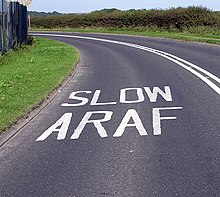araf
Jump to navigation
Jump to search
Middle Welsh
[edit]Etymology
[edit]From Proto-Celtic *aramo- (“quiet”), from Proto-Indo-European *h₁r̥h₃-mo-, from Proto-Indo-European *h₁reh₃- (“rest”). Cognate with Sanskrit ईरमा (īrmā́, “to keep still”), रात्री (rātrī, “night”), Ancient Greek ἐρωή (erōḗ, “rest”), German Ruhe (“rest”).[1]
Pronunciation
[edit]Adjective
[edit]araf
Derived terms
[edit]- araueð (“slowness”)
Descendants
[edit]- Welsh: araf
Mutation
[edit]| Middle Welsh mutation | |||
|---|---|---|---|
| Radical | Soft | Nasal | H-prothesis |
| araf | unchanged | unchanged | haraf |
| Note: Some of these forms may be hypothetical. Not every possible mutated form of every word actually occurs. | |||
References
[edit]Further reading
[edit]- Matasović, Ranko (2009) “aramo-”, in Etymological Dictionary of Proto-Celtic (Leiden Indo-European Etymological Dictionary Series; 9), Leiden: Brill, →ISBN, pages 39-40
Turkish
[edit]Etymology
[edit]From Ottoman Turkish اعراف (araf), from Arabic أَعْرَاف (ʔaʕrāf), plural of عُرْف (ʕurf, “crest, height”).
Noun
[edit]araf (definite accusative arafı, uncountable)
- (Islam) A'raf, a limbo realm between Heaven and Hell inhabited by those whose sins and virtues are evenly balanced.
- purgatory
Welsh
[edit]
Etymology
[edit]From Middle Welsh araf.
Pronunciation
[edit]- (North Wales, standard) IPA(key): /ˈarav/
- (North Wales, colloquial) IPA(key): /ˈara/
- (South Wales) IPA(key): /ˈa(ː)rav/
Adjective
[edit]araf (feminine singular araf, plural araf, equative arafed, comparative arafach, superlative arafaf)
- slow
- Siaradwch yn araf os gwelwch yn dda.
- Speak slowly please.
Derived terms
[edit]Mutation
[edit]| Welsh mutation | |||
|---|---|---|---|
| radical | soft | nasal | h-prothesis |
| araf | unchanged | unchanged | haraf |
| Note: Some of these forms may be hypothetical. Not every possible mutated form of every word actually occurs. | |||
Categories:
- Middle Welsh terms inherited from Proto-Celtic
- Middle Welsh terms derived from Proto-Celtic
- Middle Welsh terms inherited from Proto-Indo-European
- Middle Welsh terms derived from Proto-Indo-European
- Middle Welsh terms with IPA pronunciation
- Middle Welsh lemmas
- Middle Welsh adjectives
- Turkish terms inherited from Ottoman Turkish
- Turkish terms derived from Ottoman Turkish
- Turkish terms derived from Arabic
- Turkish lemmas
- Turkish nouns
- tr:Islam
- tr:Religion
- Welsh terms inherited from Middle Welsh
- Welsh terms derived from Middle Welsh
- Welsh terms with IPA pronunciation
- Welsh lemmas
- Welsh adjectives
- Welsh terms with usage examples
